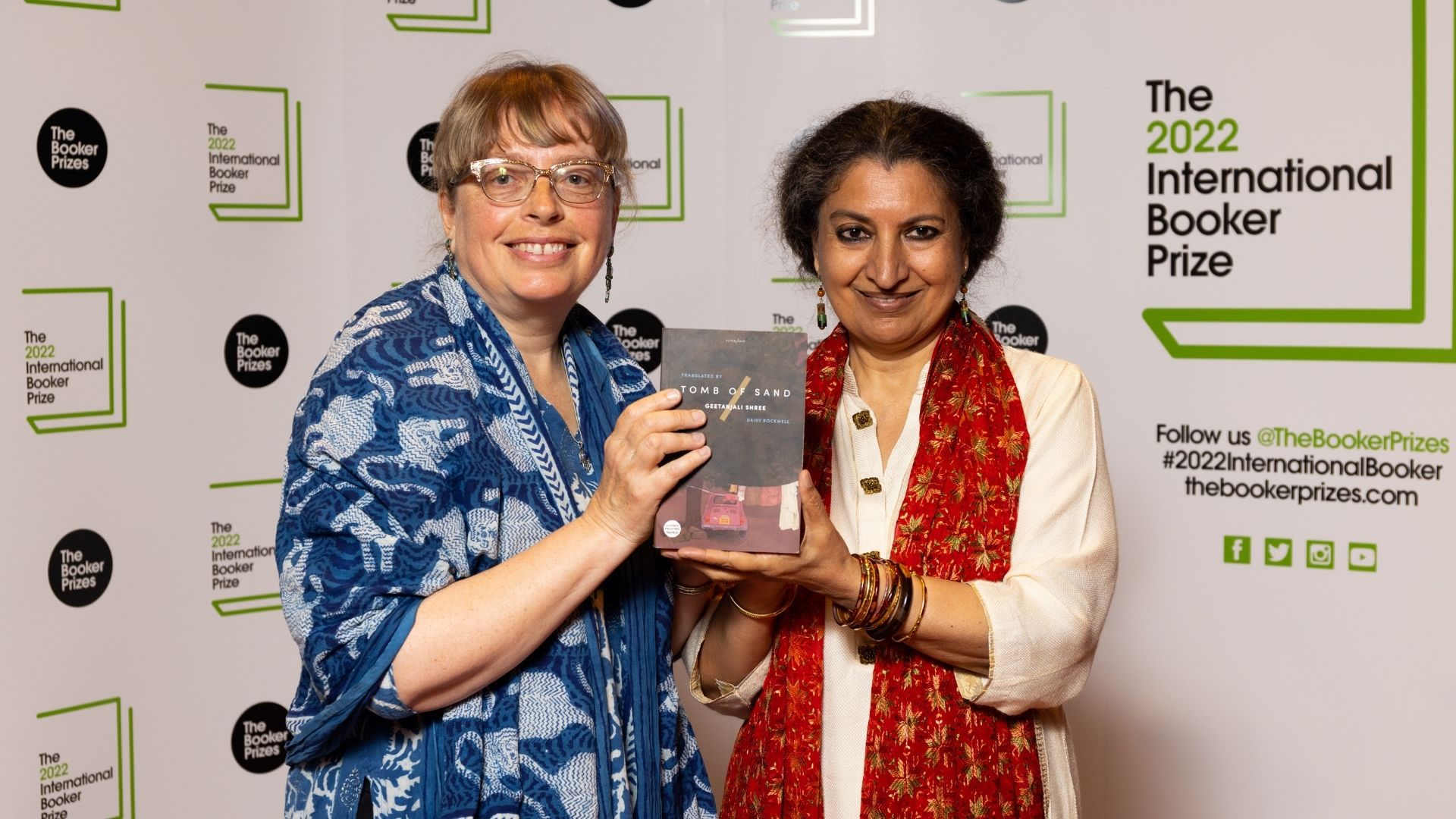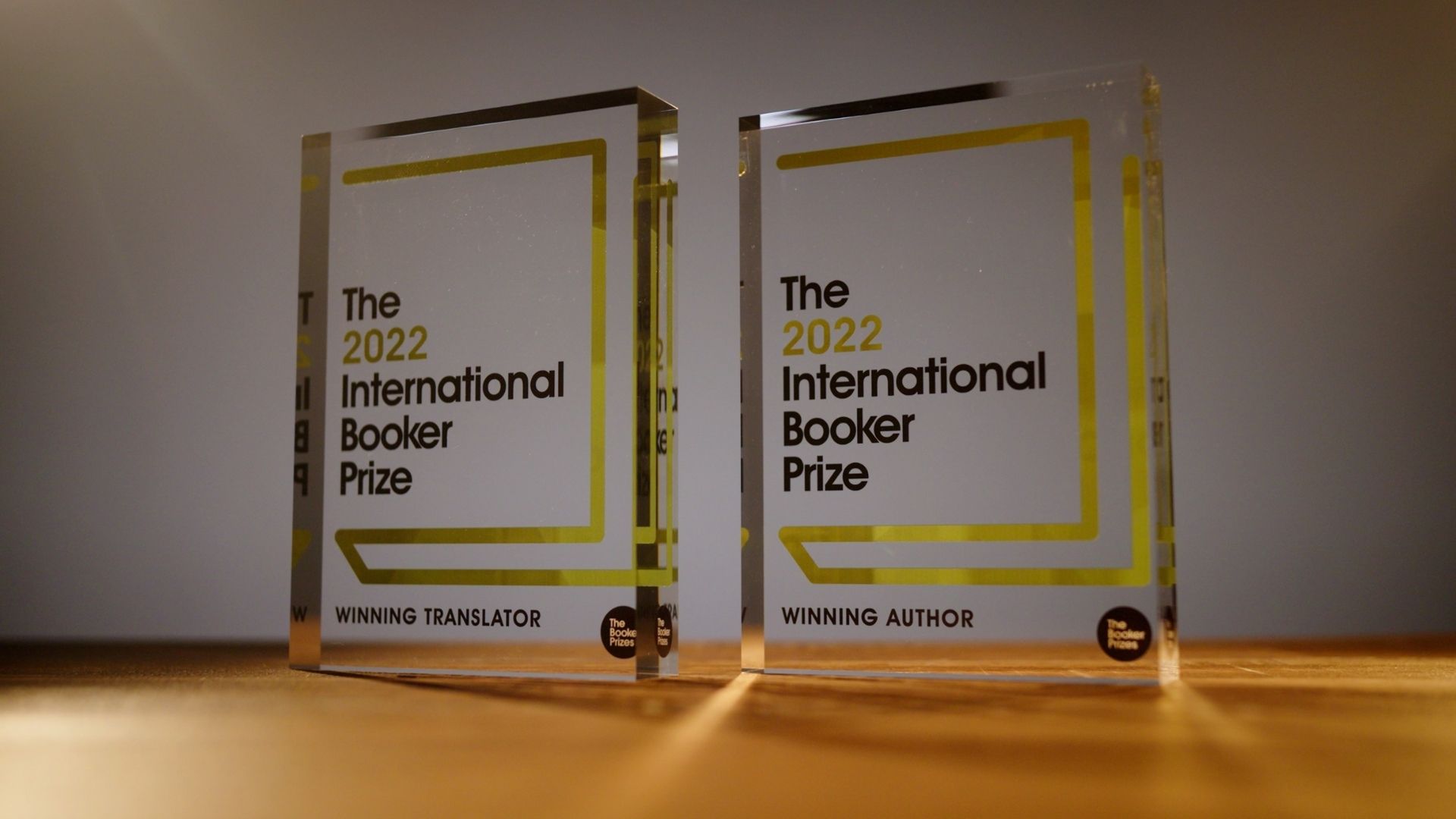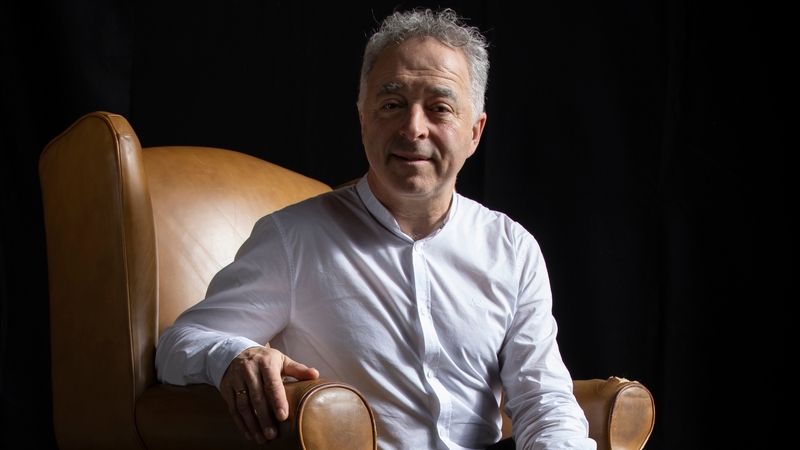You are viewing your 1 free article this month. Login to read more articles.
Shree and Rockwell win £50k International Booker Prize for ‘kaleidoscopic’ Tomb of Sand
Tomb of Sand (Titled Axis), written by Geetanjali Shree and translated by Daisy Rockwell, has won the £50,000 International Booker Prize, making it the first book originally written in any Indian language to win the prize and the first novel translated from Hindi to be recognised.
Chair of judges Frank Wynne announced the winning novel at a ceremony at One Marylebone in London. He described the work as “a luminous novel of India and Partition, but one whose spellbinding brio and fierce compassion weaves youth and age, male and female, family and nation into a kaleidoscopic whole”.
Originally published in Hindi in 2018, Tomb of Sand was awarded one of English PEN’s coveted translation awards, which encourages UK publishers to acquire more books from other languages by helping them to meet the costs of translating new works into English.
It was published in English by Tilted Axis Press in August 2021. The novel marks the first time the independent publisher, which was founded by Deborah Smith, winner of the 2016 Man Booker International Prize for her translation of Korean author Han Kang’s The Vegetarian (Portobello Books), has been recognised by the prize.
Tomb of Sand is set in northern India, and follows an 80-year-old woman who slips into a deep depression at the death of her husband, then resurfaces to gain a new lease of life. Her determination to fly in the face of convention – including striking up a friendship with a hijra person – confuses her bohemian daughter, who is used to thinking of herself as the more modern of the two.
To her family’s consternation, she insists on travelling to Pakistan, simultaneously confronting the unresolved trauma of her teenage experiences of Partition, and re-evaluating what it means to be a mother, a daughter, a woman and a feminist.
The judges said: “Rather than respond to tragedy with seriousness, Geetanjali Shree’s playful tone and exuberant wordplay results in a book that is engaging, funny and utterly original, at the same time as being an urgent and timely protest against the destructive impact of borders and boundaries, whether between religions, countries or genders.”
In a press conference, Wynne said he thought it was a “pity” that, despite Britain having a very long relationship with the Indian sub-continent, “very few books are translated from Indian languages”. He said this was partly because a “subsection of Indian writers write in English and perhaps we feel we already have the Indian writers that we need”. However, he stressed: “Unfortunately, there are many Indian writers of whom we are unaware simply because they have not been translated.”
He praised the novel as “extraordinarily exuberant and incredibly playful” despite its serious subject matter, and lauded Rockwell’s translation as “stunningly realised, the more so because so much of the original depends on wordplay on the sounds and cadences of Hindi”.
Wynne has been a vocal chair of judges this year, calling on publishers to reward translators more generously for the part they play in creating books, including offering them royalties on book sales, as well as joining in campaigns to see translators named on the cover.
At the press conference, he pushed back against claims, particularly from larger publishers, that publishing translations is difficult. “Literature in translation is not some form of cod liver oil that’s supposed to be good for you. It is as wonderful, as entertaining, as enlightening, and yes, as infuriating, as dull and as mediocre as books that are in English. We simply need more of them.”
He described this year’s shortlist as “exceptionally strong” but said Tomb of Sand was “overwhelmingly” chosen by the judges. Despite its lack of review coverage, which he put down to “culture pages in the British media [being] absolutely laid waste over the past 20 years”, he said he would be “gobsmacked” if winning the award didn’t increase sales “by more than 1,000% in the next week”.
Shree is the author of three novels and several story collections, and has been translated into English, French, German, Serbian and Korean. This is the first of her books to be published in the UK. She has received and been shortlisted for a number of awards and fellowships, and lives in New Delhi.
She said she was "amazed, delighted, honoured and humbled" to have received the prize, noting: "The Booker will surely take it to many more people than it would have reached otherwise."
"Behind me and this book lies a rich and flourishing literary tradition in Hindi and in other south Asian languages and the world will be the richer for knowing some of the finest writers in these languages. The vocabulary of life will increase from such an interaction," she said.
She told The Bookseller she would like to do "something good with the prize money" although she wasn’t sure where she would like to make a difference yet, joking: "I wouldn’t want to use it just for a luxury cruise".
Rockwell is a painter, writer and translator living in Vermont, US, and has translated a number of classic works of Hindi and Urdu literature, including Upendranath Ashk’s Falling Walls (Penguin), Bhisham Sahni’s Tamas (Penguin) and Khadija Mastur’s The Women’s Courtyard (Penguin). Her 2019 translation of Krishna Sobti’s A Gujarat Here, a Gujarat There (Penguin) was awarded the Modern Language Association’s Aldo and Jeanne Scaglione Translation Prize.
She told The Bookseller it "meant everything" to win the prize, especially considering the "huge field of translation within India into English and between languages".
"Of course there’s at least 14 Indian languages with active literary traditions that go back some 200 to 300 years, even thousands of years. But there’s virtually nothing that’s published outside of India, there’s very little interest," she said. "It’s not just a personal thing, this is about bringing our community outside the borders of India and into the limelight. So many deserving authors and translators should be heard from and we’re delighted to forge a path for all of them".
Kristen Alfaro, publisher at Tilted Axis, said she was "overwhelmed with joy" that "an incredible feat of literature" has been recognised. She said the publisher was "really excited to bring new languages into translation" and emphasised the personal connection the press forges with its writers and translators.
This year’s judges, which also included author and academic Merve Emre, writer and lawyer Petina Gappah, writer, comedian and presenter Viv Groskop and translator and author Jeremy Tiang, considered 135 books, with a record number of submissions received. The contribution of author and translator is given equal recognition, with the £50,000 prize split between Shree and Rockwell.
The winners were picked from a shortlist featuring Jon Fosse’s A New Name: Septology VI-VII (Fitzcarraldo Editions) translated from Norwegian by Damion Searls, Olga Tokarczuk’s The Books of Jacob (Fitzcarraldo Editions) translated from the Polish by Jennifer Croft, Bora Chung’s short story collection Cursed Bunny (Honford Star), translated from the Korean by Anton Hur, Mieko Kawakami’s Heaven (Picador) translated from Japanese by Samuel Bett and David Boyd and Claudia Piñeiro’s Elena Knows (Charco Press) translated from the Spanish by Frances Riddle.
Shree and Rockwell will be appearing at Hay Festival on 29th May.

















